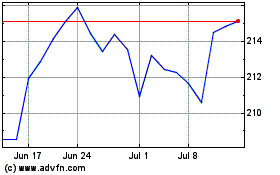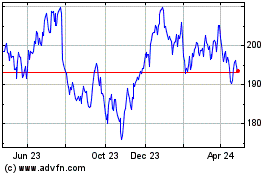EgyptAir Findings Don't Point to Midair Blast
June 13 2016 - 6:00PM
Dow Jones News
Egyptian officials probing the crash of EgyptAir Flight 804 said
Monday the plane veered off course before plunging into the sea,
suggesting an abrupt in-flight explosion didn't bring down the
aircraft.
The Airbus Group SE A320 plane bound for Cairo from Paris
deviated from its course while flying at 37,000 feet, first turning
left before rolling to the right and completing a full circle,
investigators said in their latest update into the May 19 crash
that killed all 66 people onboard.
The finding confirms statements initially made by Greek
officials about the last seconds of flight but initially rejected
by Egyptian authorities, who suggested contact was lost more
abruptly. Investigators have spent the past few days going over all
available radar information to reconcile the conflicting
theses.
The Egyptian finding does little to explain why the plane
crashed into the Mediterranean Sea. No cause has been ruled out,
Egyptian officials have said, including potential hostile
action.
The radar findings suggest, though, that there wasn't a sudden
explosion that tore the plane apart midair.
The Airbus A320 broadcast a number of fault messages before all
contact was lost, indicating possible smoke in the nose of the
plane, including a critical electronic-equipment hub beneath the
cockpit. The messages alone haven't proved sufficient to determine
a likely cause for the crash, investigators have said. That has
added urgency to recovering the plane's so-called black boxes that
store technical data as well as conversations in the cockpit.
Egypt also said it has invited the U.S. National Transportation
Safety Board to participate in the investigation. U.S. crash
investigators have been eager to assist in the crash probe. A
technical expert from the maker of the plane's so-called black
boxes, Honeywell International Inc., also has been invited to join,
Egypt said. French air-accident investigators have been assisting
the probe almost from the start.
The cockpit voice and flight-data recorder typically provide the
best clues to why an aircraft crashed.
Investigators are still trying to pinpoint the exact location of
the Airbus A320's data-storage units almost two weeks after a
French vessel first detected a signal from a beacon belonging to
one of the black boxes.
Egyptian officials said a second vessel to aid the hunt has
arrived in the search zone. The John Lethbridge, belonging to Deep
Ocean Search Ltd., is equipped with a scanning sensor that could
allow investigators to pinpoint the exact location of the main body
of the plane and is also carrying equipment to eventually recover
the black boxes.
Investigators are in a race against time. The beacons on the
black boxes are required to last for 30 days, though they can
remain active for longer.
Write to Robert Wall at robert.wall@wsj.com and Andy Pasztor at
andy.pasztor@wsj.com
(END) Dow Jones Newswires
June 13, 2016 17:45 ET (21:45 GMT)
Copyright (c) 2016 Dow Jones & Company, Inc.
Honeywell (NASDAQ:HON)
Historical Stock Chart
From Mar 2024 to Apr 2024

Honeywell (NASDAQ:HON)
Historical Stock Chart
From Apr 2023 to Apr 2024
